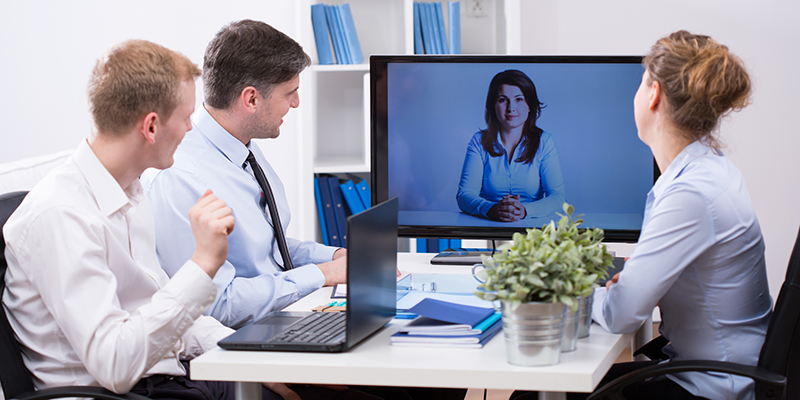Are You Skype-Interview Ready?
Tips to help you land your next job in a tech-savvy world.
By Bridget McCrea | Digital Exclusive - 2017

2D resumes, in-person interviews, phone calls? Not so much. Landing jobs today is all about flexing your modern tech savvy.
“With more technology being incorporated into the hiring process, and with jobs becoming increasingly ‘remote’ in nature, we’re definitely seeing an uptick in the number of companies that are incorporating some type of remote interview system into the process,” says Aquila E. Leon-Soon, CEO at Advance Talent Solutions Inc. in New York.
Although you’re not sitting in an actual room with your interviewer, “Skyping” is in reality still a “live” interview, where recruiter and candidate speak directly to one another in a one-on-one setting through the video-calling platform. Basically, this tool expedites a process that used to take hours to orchestrate (not to mention the rigors of the commute to and from the interview and time spent away from a current job). That said, it also presents a whole new set of challenges.
Here, then, are a few tips to guide you towards Skype success.
1. Test it out
What if you have no experience in front of the camera, don’t understand how to use Skype, or aren’t “up with the times” when it comes to transferring files or sharing presentations during the call? Potentially, that uncomfortable moment could outweigh all your great skills and experience in the eyes of a tech-savvy recruiter.
“We find the biggest challenge to be the actual use of the technology,” says Leon-Soon. “In fact, there’s always going to be a level of difficulty when you use the system for the first time.”
Which means it’s absolutely essential to test out Skype before jumping into the interview, says Leon-Soon. “This helps to avoid downtime, and ensures that the interviewer isn’t kept waiting while you fumble around with your system, trying to get it to work,” she explains.
“Try out the settings to be sure everything is working the way it should be,” advises Jana Tulloch, a human resources professional with Develop Intelligence. “There’s nothing worse than trying to connect with a candidate who can’t get their sound or video working.”
Note that Skype allows participants to share work portfolios, presentations and snippets from their resumes during the interview itself. So let’s say you created a knockout PowerPoint presentation that happened to come up during the interview. Rather than waiting until after the call, you can share and discuss the file during it.
Files can be shared via the platform’s “share screens” feature, which also allows candidates to make presentations. Before doing so, says Tulloch, shut down any open tabs and any files. “Make sure you only have those files that you want to share open on your desktop,” she says, “because when you share screens, the person you’re sharing with can see everything you do on your computer.”
2. It’s a real interview!
Also, approach your Skype interview just as you would an in-person interview. In other words, dress the part.
“We’ve had times where the person was not professionally dressed for the interview. They figured that because it’s not an in-person experience there’s no need to wear a full suit,” says Leon-Soon, “or that they can get away with wearing their PJs.”
3. Remember nonverbals speak volumes
Because a Skype interview offers the opportunity to visually connect with the hiring manager, Leon-Soon says it’s also very important to monitor your body language.
“Make sure you're looking at the interviewer at all times,” she says, “and strive to stay engaged, interested and on point—just like you would do if you were actually sitting in front of the person who was interviewing you.”
The three most important things to remember are to speak clearly, sit up straight and make eye contact with your interviewer.
4. What’s that behind you?
Finally, take an objective look at your environment before logging into your call.
“A messy room can be extremely distracting and will make it look as if you were unprepared for the interview,” Leon-Soon warns. “Go somewhere that’s free of distractions and clutter, and be sure to look your best. Technology may facilitate the interview process and bring it into your home or other casual setting, but that doesn’t mean you can take it any less seriously than you would a traditional interview.”